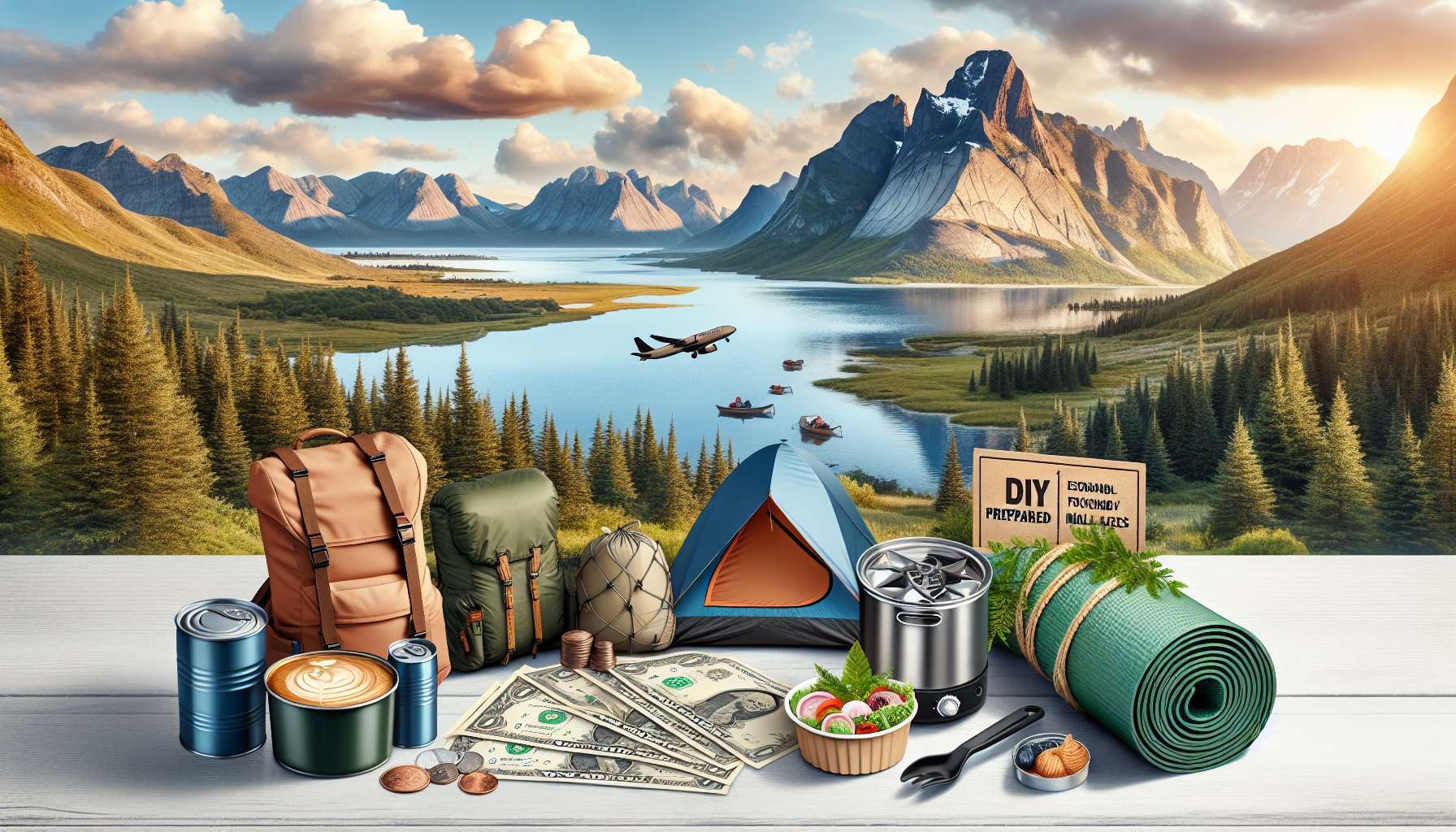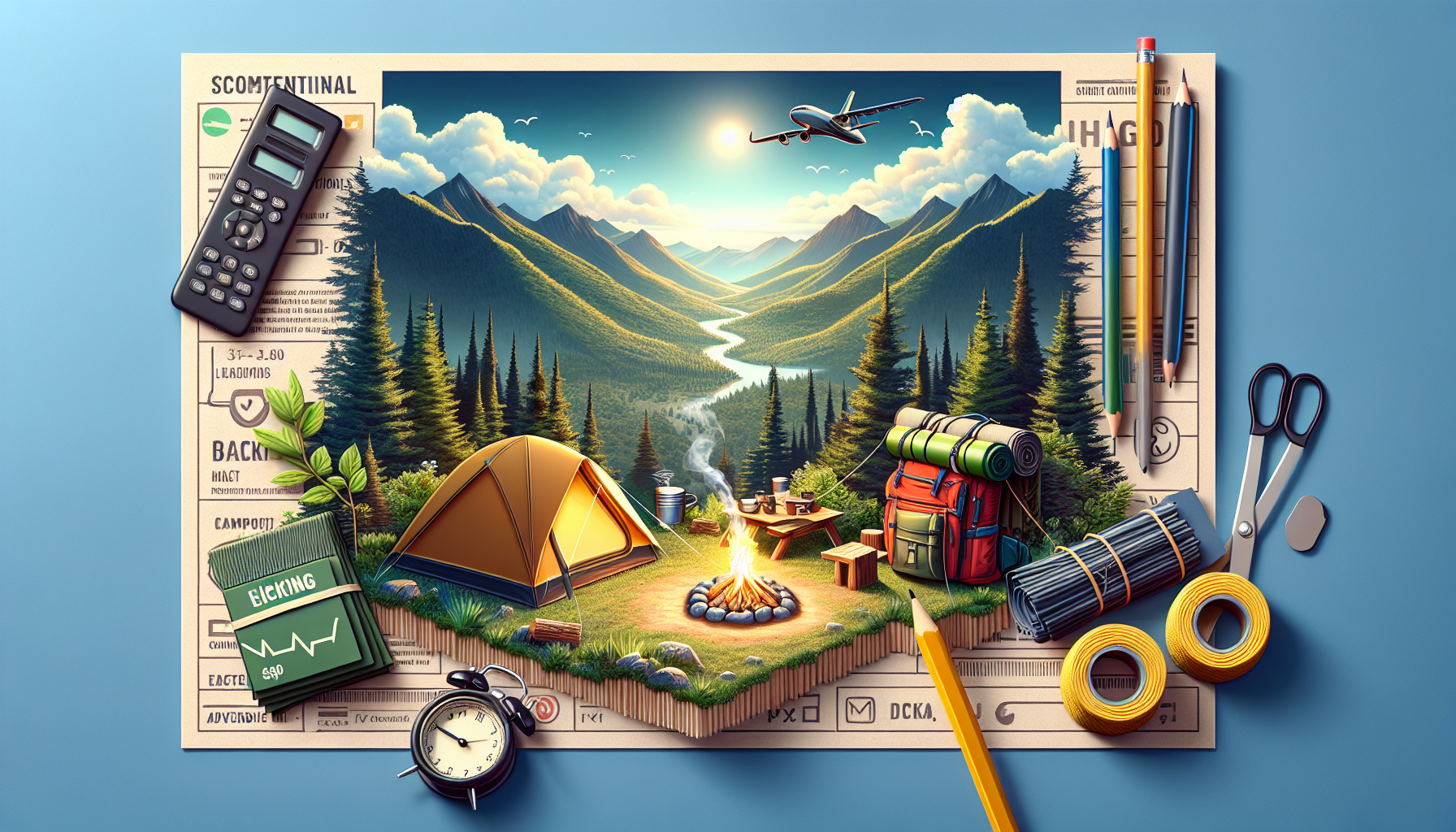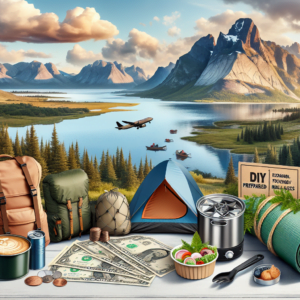Are you an outdoor enthusiast who loves the thrill of adventure but worries about breaking the bank? Look no further! In this article, we will explore a variety of budget-friendly tips that will help you save money while enjoying the wonders of the wilderness. From affordable camping gear to money-saving meal ideas, we’ve got you covered. So, grab your hiking boots and get ready to embark on an exciting and cost-effective outdoor journey.

Hiking and Camping Equipment
Buy Used Gear
When it comes to hiking and camping gear, buying used can be a great way to save money. Websites like Craigslist and Facebook Marketplace often have listings for gently used gear at a fraction of the cost of buying new. Plus, buying used gear helps reduce waste and is more environmentally friendly.
Rent Gear
If you don’t plan on using certain equipment frequently, renting can be a cost-effective option. Many outdoor gear stores and even some national park visitor centers offer gear rental services. This way, you can enjoy top-quality gear without the upfront investment.
Borrow from Friends
If you have friends or family members who are also outdoor enthusiasts, consider borrowing gear from them. This can be a great way to try out different brands or types of equipment before making a purchase. Plus, it’s a win-win situation as you get to save money and they get to see their gear being put to good use.
Opt for Multi-purpose Gear
Investing in multi-purpose gear can save you both money and space in your backpack. Look for items like multi-tool knives, cookware sets that double as storage containers, and clothing that can be layered for different weather conditions. By choosing gear that serves multiple purposes, you can simplify your packing and reduce the need to buy additional items.
Outdoor Clothing
Shop Off-Season
One of the best ways to save on outdoor clothing is to shop off-season. Retailers often offer significant discounts on clothing at the end of the season to make room for new inventory. Stock up on winter gear during the summer and vice versa to take advantage of these sales.
Look for Sales and Discounts
Keep an eye out for sales and discounts at outdoor retailers. Sign up for their newsletters or follow their social media accounts to stay updated on any promotions or flash sales. Additionally, many retailers offer discounts for students, military personnel, or members of outdoor organizations, so be sure to check if you qualify.
Choose Versatile Clothing
When selecting outdoor clothing, opt for versatile pieces that can be worn in a variety of conditions. Look for clothing made from moisture-wicking and breathable fabrics that can be layered for warmth. By choosing versatile clothing, you can reduce the need to buy specialized gear for different activities or weather conditions.
Layering is Key
Layering your clothing is essential for staying comfortable in changing outdoor conditions. Instead of investing in expensive, bulky jackets, focus on layering thinner pieces. This way, you can easily adjust your clothing to regulate your body temperature as needed. A base layer, mid-layer, and outer shell are all you need to tackle different weather conditions.
Food and Water
Pack and Prepare Your Own Meals
One of the biggest advantages of camping is being able to prepare your own meals. By packing and preparing your own food, you can save a significant amount of money compared to dining out. Plan your meals ahead of time, make a detailed grocery list, and bring your own camping stove or firewood for cooking. Don’t forget to pack reusable containers to store leftovers and minimize waste.
Buy in Bulk
Buying food in bulk can save you money in the long run. Look for non-perishable items like granola bars, nuts, and dried fruits that have a long shelf life. Additionally, consider purchasing larger containers of condiments and spices, which can be used for multiple meals. Just be mindful of weight and storage limitations when buying in bulk.
Utilize Natural Food Sources
If you’re hiking or camping in an area with natural food sources, take advantage of what the wilderness has to offer. Research edible plants and berries in the area and forage responsibly. Fishing is another great option for obtaining fresh food while enjoying the outdoors. Just make sure to check local regulations and obtain any necessary permits.
Hydrate Efficiently
Rather than relying on bottled water, invest in a high-quality water filter or purification system. This will allow you to drink water from natural sources like streams or lakes, eliminating the need to carry heavy water bottles. Additionally, bring reusable water bottles and fill them up whenever you come across a safe water source. Staying hydrated is crucial for your outdoor adventures, and this way, you can save money and reduce waste.
Transportation and Accommodation
Carpool with Friends
If you’re heading to the wilderness with friends, consider carpooling to save on transportation costs. Sharing the cost of gas and splitting the driving responsibilities can significantly reduce expenses. Plus, carpooling adds to the fun of the trip and allows you to bond with your fellow outdoor enthusiasts.
Choose Free Camping Spots
There are many free camping spots available for those on a budget. National forests, Bureau of Land Management (BLM) areas, and some state parks often offer free or low-cost campsites. Research and plan your trip accordingly to take advantage of these budget-friendly options. However, be sure to follow any regulations or permit requirements for camping in these areas.
Consider Alternative Accommodations
If camping isn’t your preferred way of spending the night outdoors, consider alternative accommodations that offer a more budget-friendly experience. Look into renting a cabin or yurt in state or national parks, as these options are often cheaper than hotels. Additionally, some parks have designated areas for RV or van camping, which can be a cost-effective alternative for shelter.
Utilize Public Transportation
If your outdoor adventure takes you to a destination accessible by public transportation, take advantage of it. Public transportation can be a greener and more economical option compared to driving. Research bus or train routes to popular outdoor destinations and plan your trip accordingly. Not only will you save money on gas and parking, but you’ll also reduce your carbon footprint.

This image is property of pixabay.com.
Planning and Research
Plan in Advance
Planning your outdoor adventure well in advance can save you both time and money. Research the area you’ll be visiting, take note of any permits or fees required, and make reservations for campsites or accommodations. By planning ahead, you can secure lower prices, avoid last-minute stress, and ensure you have all the necessary information for a successful trip.
Find Free or Affordable Activities
Outdoor activities don’t have to break the bank. Look for free or low-cost activities in the area you’ll be visiting. Hiking, wildlife watching, and stargazing are often free or inexpensive options. Additionally, many national parks and forests offer ranger-led programs or interpretive exhibits at no extra charge, providing educational and entertaining experiences for outdoor enthusiasts.
Research Local Deals and Discounts
Before embarking on your outdoor adventure, research any local deals or discounts that may be available. Some parks or outdoor activity providers offer special promotions during certain times of the year. Look for discounted admission fees, equipment rentals, or guided tours that can help you save money while enjoying the outdoors.
Join Outdoor Enthusiast Communities
Being part of outdoor enthusiast communities can provide valuable insights and money-saving tips. Join online forums, social media groups, or local meetup groups to connect with fellow outdoor enthusiasts. You can learn from their experiences, get recommendations on budget-friendly destinations, and even find opportunities for shared equipment or rides.
Safety and First Aid
Invest in Quality Safety Equipment
When it comes to safety in the wilderness, it’s worth investing in quality gear. This includes items such as sturdy hiking boots, a reliable GPS or compass, and a durable headlamp. While these items may have a higher upfront cost, they will last longer and provide better performance, ultimately saving you money in the long run.
Learn Basic First Aid Skills
Having basic first aid skills is essential for any outdoor enthusiast. Taking a first aid course or carrying a comprehensive first aid guide can help you handle minor injuries or emergencies. By knowing how to treat small wounds, blisters, or sprains, you can potentially avoid costly visits to medical facilities.
Pack Essential Medications
If you require medication on a regular basis, be sure to pack enough for the duration of your outdoor adventure. Running out of necessary medication in a remote location can be both costly and dangerous. Keep your medications in a waterproof and secure container to ensure they remain safe and effective during your trip.
Be Mindful of Wildlife to Avoid Accidents
To stay safe in the wilderness, it’s important to be mindful of wildlife and their habitats. Research the area you’ll be visiting to understand any potential risks or encounters. Properly store food to avoid attracting animals and follow guidelines for food waste disposal. By being respectful of the wildlife, you can minimize the risk of accidents and costly encounters.

This image is property of pixabay.com.
Storage and Organization
Use Reusable Containers
Invest in durable and reusable containers for storing your gear and supplies. Avoid using single-use plastic bags or disposable containers, as they can easily tear or break, resulting in potential damage to your gear. Opt for sturdy plastic containers, dry bags, or cloth sacks that can withstand rough handling and keep your belongings organized and protected.
Utilize Clear Storage Boxes
Clear storage boxes are a great way to keep your gear organized and easily accessible. By using transparent containers, you can quickly locate the items you need without having to dig through multiple bags or boxes. Additionally, clear storage boxes help protect your gear from moisture and pests while allowing you to easily do inventory checks.
Label and Keep Inventory of Gear
Labeling your gear and keeping an inventory list can save you time and money. By clearly labeling your containers and gear, you can easily identify what you have and prevent any mix-ups or loss. Create an inventory checklist to keep track of your equipment, making it easier to replace or repair any missing or damaged items.
Optimize Space in Backpacks and Vehicles
When packing for your outdoor adventure, make the most efficient use of space in your backpack or vehicle. Roll clothing items tightly to maximize space and use packing cubes or compression bags to further reduce bulk. Consider the weight distribution and balance in your backpack, and if using a vehicle, use storage solutions like roof racks or cargo organizers to optimize space and ensure everything stays secure.
Maintenance and Repairs
Perform Regular Gear Maintenance
Regular maintenance is key to extending the life of your outdoor gear. Inspect your equipment before each trip and clean them after use. Properly store your gear to avoid damage from moisture, dust, or pests. Routine maintenance can help identify small issues early on, preventing the need for costly repairs or replacements.
Learn Basic Repair Skills
Learning basic repair skills can save you money in the long run. Mastering simple repairs like stitching up a torn tent or patching a hole in your sleeping bag can prolong the lifespan of your gear. Invest in a repair kit that includes essential tools and materials, and practice the necessary skills before heading out on your outdoor adventure.
Use Repair Kits and Tools
Having a repair kit on hand can save you from expensive gear replacements. These kits often include items like adhesive patches, replacement buckles, and sewing supplies. By having the necessary tools and materials readily available, you can address small repairs promptly, keeping your gear functional and avoiding additional expenses.
Invest in Durable Gear
Investing in durable gear may cost more upfront, but it can save you money in the long term. High-quality gear is built to withstand the rigors of the outdoors and is less likely to break or wear out quickly. Prioritize durability when making purchasing decisions, and think of it as a long-term investment that will pay off over multiple adventures.

This image is property of pixabay.com.
Fitness and Training
Utilize Free Outdoor Exercise Options
Staying fit for outdoor activities doesn’t require an expensive gym membership. Take advantage of free outdoor exercise options like hiking, jogging, or cycling. Many parks have designated trails or fitness stations that can be used at no cost. Embrace the natural surroundings and get your workout while enjoying the great outdoors.
Take Advantage of Outdoor Fitness Events
Outdoor fitness events or classes provide an opportunity to try new activities and meet like-minded individuals. Look for free or low-cost fitness events in your area, such as yoga in the park or group hikes. These events often have experienced instructors who can teach you proper techniques and help you stay motivated without breaking the bank.
Find Budget-Friendly Fitness Classes
If you’re looking for more structured fitness classes, search for budget-friendly options in your community. Many local recreation centers or community centers offer discounted rates for fitness classes compared to private gyms. Consider trying activities like rock climbing, kayaking, or indoor climbing walls, which can provide a fun and challenging workout.
Stay Consistent to Reduce Injuries
Consistency in your fitness routine is crucial for reducing the risk of injuries during outdoor activities. Gradually build up your endurance and strength with regular workouts. By staying active on a consistent basis, you’ll be better prepared for the physical demands of hiking, backpacking, or other outdoor pursuits. This can help you avoid costly medical bills resulting from preventable injuries.
Leave No Trace Principles
Follow Leave No Trace Principles
Respecting the environment and practicing Leave No Trace principles is not only the ethical thing to do but also an essential part of being a responsible outdoor enthusiast. Leave No Trace promotes minimizing your impact on the environment. This includes principles like packing out your trash, staying on designated trails, and leaving natural and cultural artifacts untouched.
Leave the Wilderness as You Found It
Aim to leave the wilderness in the same condition as you found it, if not better. Pack out all trash, even if it’s biodegradable. Dispose of human waste properly by using designated facilities or digging cat holes at least 200 feet away from water sources. Respect and preserve the natural beauty around you, so future generations can enjoy the same experience.
Dispose of Waste Properly
Proper waste disposal is essential for protecting the environment and other hikers’ experiences. Follow any regulations regarding waste disposal, such as using bear-resistant containers in bear-populated areas. Pack out all non-biodegradable waste and dispose of it responsibly when you have access to proper facilities.
Be Respectful of Wildlife and Local Communities
Respecting wildlife and local communities is crucial for maintaining a positive outdoor experience. Keep a safe distance from wildlife and never feed or approach them. Observe and appreciate them from afar. When visiting local communities, be respectful of their customs, traditions, and natural resources. Support local businesses and leave a positive impression as an outdoor enthusiast.


